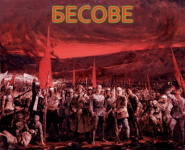SONIC THE COMMONS
PRIME MINISTERS OF THE UNITED KINGDOM OF GREAT BRITAIN AND NORTHERN IRELAND
John Major, 1990 - 1993 (Conservative)
John Major, summer 1993 (Government of National Unity)
Malcolm Rifkind, September 1993 (Government of National Unity (Belfast))
Virginia Bottemley, 1993 - 1997 (government-in-exile)
--
EMPERORS OF BRITAIN
Doctor Ivo Robotnik, 1993 - 1997 (Ruled By Robotnik)
---
PRIME MINISTERS OF THE UNITED KINGDOM OF GREAT BRITAIN AND NORTHERN IRELAND
Virginia Bottemley, 1997 (Restoration)
---
PRIME MINISTERS OF THE UNITED KINGDOM OF BRITISH AND NORTHERN IRISH ZONES
John McDonnell, 1997 - 2002 (New Labour)
Jeremy Clarkson, 2002 - 2007 (Independence)
Russell Brand, 2007 - 2010 (On The March coalition with New Labour)
Owen Jones, 2010 - 2012 (On The March coalition with New Labour)
Nicola Sturgeon, 2012 - (Democratic Alliance Party)
It was the ultimate black swan: top scientist Dr Kintobor being mentally damaged in a lab accident, calling himself "Robotnik", and launching a coup with an army of bizarre robots. After four years of dictatorship and US-EU forces at the Irish border, the madman was finally deposed by a scattered uprising and an EMP weapon triggered at Citadel Robotnik by Tower Bridge.
Now came restoring order. And it became very clear that however much the exile population and conservatives wanted it all to go back to normal, politics as it had been since 1945 was gone.
Part of this was likely down to the government-in-exile being comprised of MPs, Lords, and diplomats who'd simply been lucky to be out of the UK when the Badniks took Belfast: Bottomley, for all her efforts, was not inspiring enough a figure to reestablish the old order. Unfortunately for the hard left, who now saw their chance, the weary population didn't want a strong authority of any kind either: they wanted nobody strong enough to impose a harsh rule again, and the experience of resistance and occupation had strengthened local ties. Bottemley was forced to accept a referendum into reforming the UK to be a series of powerful regional zones. (Scottish nationalists were unhappy to find Scotland split into two of them)
While resistance strongman "Big John" McDonnell took the newly formed socialistic New Labour party into power in Westminster, the zones were more diverse and McDonnell only controlled foreign policy, some of the economy and welfare, and defence (and even that had regional "Yeomanry" divisions). He used every ounce of political streetfighting from his days in London borough politics to get through as much reforms as he was able, but the slow progress and messy regional clashes allowed right-wing populist pundit Clarkson to sweep into power... to find the same regional issues. Clarkson was in favour of small government and hoped to not only slim it down further, but force some of the more powerful zones to downscale. When things didn't go his way quickly enough (not even in zones held by Independence), Clarkson became bad-tempered and petulant, causing the country to stagnate further as things ground to a halt and cuts wore down more services. The EU saw the UK as a drag on the union.
In 2007, Britain faced a "youthquake" from the children of R.B.R. and the disgruntled twenty-somethings tired of "a flailing, failing country" as Brand put it. A controversial actor turned activist who ran the Trews radio station, Brand was the 'anti-Clarkson': promising as large a government as possible, taxing foreign corporations, investing in services and infrastructure and the environment. While his On The March party didn't have enough votes to form a majority, it could form one with New Labour and the "youthquake" gave them a good number of zones. Unfortunately, Brand's erratic personality, petulance, and interest in conspiracy theories (he stated in Commons that Robotnik had been working for "someone and maybe we'll find out who") meant how well any of his plans worked depended largely on the minister or assembly leader on the ground. New Labour and disgruntled On the March members ran a no-confidence vote, and the Minister for Culture & Media took control; while Jones was able to better steer the ship, the reputational damage was done and electoral loss was certain.
By now, Britain wanted some control again and turned to Sturgeon. She'd been in the Scottish National Party pre-R.B.R., a dissident during R.B.R., and one of the first Member of Zones in 1997; she'd been a founder of the Democratic Alliance of centre-left technocratic MZs, part of the 'gradualist' wing that hoped to take over zones and then Westminster, and in her case hoping that this could lead to Scottish independence in the long term. When she was party leader and running in the Wesminster election, she had both Scottish zones run by the DAP.
Popularly, Sturgeon was seen as a "grown-up" returning Britain to the days of stable government (she was privately irritated by comparisons to Thatcher). With capture of zones, her government could more easily pass its policies. Rumours of nepotism, corruption, and 'big man' politics were ignored as long as the economy seemed okay and Sturgeon seemed mature & with-it; even the return to austerity politics over time got ignored as she brought in social reforms and played up to an idea of exceptionalism. But her long-term goal of Scottish independence would founder: nationalism was down and a referendum failed, so she settled for merging the two Scottish zones into one big Scotland Zone, and that cost her political capital (the MZs didn't like the idea many of them would lose seats and power).
She narrowly clung on despite all predictions and the DAP just about keep control. While the wags refer to this as Ruled By Sturgeon or call her Robotnicola, she seems unstoppable. Proper grown-up government is back and nothiGUYS HAVE YOU SEEN THIS SCANDAL THAT JUST--



